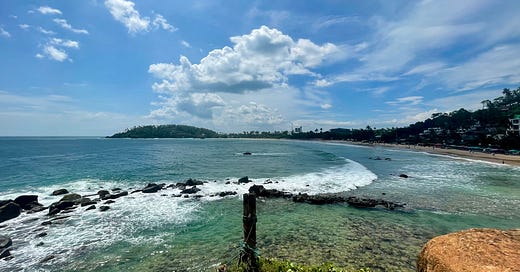I recently got back from a backpacking trip to Sri Lanka. It might have been the best trip of my life.
The first few days were perfect. I started at Colombo, then Kandy, and then took the most scenic train to Ella. There, I stayed in beautiful little hostel, the kind of place where strangers become friends over food and drinks and stories that only make sense if you were there. The weather was good, the people were good, and for a brief moment, life felt like one of those travel montages in a movie where everything is sunlit and effortless.
And then, at some point, it wasn’t.
The last few days of the trip—after I left Ella and started moving towards the south—felt different. I moved to beach towns, stayed in new hostels, but they weren’t the kind where people gather and talk late into the night. And it wasn’t that I wasn’t doing things—I was—but without people to share it with, things felt smaller somehow.
You could say my trip had two distinct emotional arcs—one where everything felt alive and cinematic, and another where it all faded into something quieter, lonelier.
When I look at the photos now, I don’t just remember what happened—I also remember how I felt. Which is why some pictures feel like warmth and laughter, and others feel like empty chairs at an empty table.
Memory isn’t just a record of places after all; it’s also a record of emotions tied to those places.
The French novelist Marcel Proust once wrote that our past isn’t stored in a single place but scattered across sensations—smells, tastes, objects. And, in my case, photographs. The ones from the first half of the trip, I look at again and again, trying to sink back into the joy. The others, I scroll past quickly, because who wants to relive loneliness?
But the thing is, my sadness about the last bit of the trip isn’t really about it being bad—it’s about contrast. The presence of joy makes its absence feel heavier. And maybe that’s not a flaw in the experience but proof that it mattered. That I was paying attention.
Also, the thing about being alone—not just alone, but alone and a little bit lonely—is that it gives you an unreasonable amount of time to think. And with nothing to distract me, I also found myself having these long, meandering conversations with myself—asking questions I didn’t quite know how to answer.
Somewhere in that process, I think I got to know myself a little better.
It’s strange to say, but after pondering upon it I realised that this loneliness flipped some kind of switch in me. Not in a dramatic, epiphany-filled way, but in the quiet realisation that I am, in some way, different now. I know my mindset has shifted, even though it’ll take a while to translate that into action. And maybe that’s the paradox of travel—you always go looking for new places and people, but sometimes what you really end up discovering is yourself. I know it’s a cliché, but doesn’t mean it isn’t true.
I don’t know. Maybe sadness, or melancholy, or loneliness isn’t just something we endure, but something that shapes us in ways we don’t fully understand until much later. At least, in this case, that’s what happened.
I spent a lot of time in Sri Lanka engaged in deep, overly dramatic conversations with myself—because what else could you do at 2 AM while staring at the bottom of the upper bunk of an unfamiliar hostel dorm room? Over the next few posts, I’ll attempt to untangle those thoughts and turn them into something resembling coherence.





